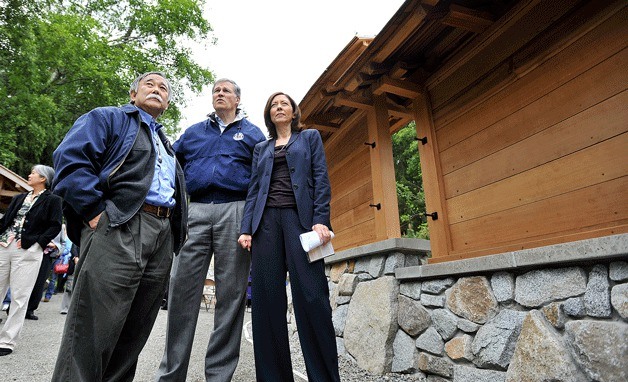Frank Kitamoto, an iconic figure in Bainbridge Island’s Japanese American community, died Saturday, March 15. He was 74.
Kitamoto was a longtime dentist on Bainbridge Island but was better known for his work to preserve and share the history of the internment of Japanese Americans during World War II.
“He was kind of a giant to me,” said Clarence Moriwaki, who worked closely with Kitamoto as part of the Bainbridge Island Japanese American Community. “He had been an outspoken champion of human rights. He was my mentor and friend.”
Kitamoto and his family were among the 227 Bainbridge Japanese Americans to be taken from Bainbridge Island on March 30, 1942, and sent to internment camps.
The families from Bainbridge were the first of nearly 12,000 Japanese Washington residents to be taken to concentration camps under President Roosevelt’s Executive Order 9066. The Kitamotos and other islanders were in the initial wave because government officials feared their proximity to crucial U.S. naval bases in Puget Sound.
They had six days to pack up their lives. At the time, Frank Kitamoto was 2 1/2, and along with his mother, Shigeko, and three sisters, Jane, 9 months old, Frances, 5, and Lilly, 7, were first sent to the Manzanar War Relocation Center in California.
A famous photograph taken during the forced removal shows the family of five — his father had already been taken in by the FBI in early February, 1942 — waiting with their suitcases and Frank holding the one thing he was allowed to carry away, his rubber toy John Deere tractor, before their departure. The family was later moved to the Minidoka War Relocation Center in Jerome County, Idaho.
Kitamoto, who was born May 28, 1939, returned to Bainbridge Island after World War II.
In 1983, Kitamoto started an oral history project on the internment with Ron Nakata and John Sakai, and made repeated visits to classrooms across Washington state and beyond to talk about the history of Japanese Americans.
Plans for a memorial service have not yet been finalized.
“He touched many, many lives; not just on the Island but across the planet, and for kids yet to be born,” said Gerald Elfendahl, who worked with Kitamoto for more than 35 years on history and heritage projects.
“Frank was just a very, very special person,” Elfendahl said.
Moriwaki recalled the slideshow presentation that was put together by Kitamoto that discussed fear and racism. He was in high demand, Moriwaki said, and would travel for anyone who asked, often on his own dime.
For Moriwaki, one slide stuck with him. In it were the words, “The opposite of love isn’t hate, but fear.”
Kitamoto and Moriwaki’s shared passion for human rights is what began the mentorship, but it was Kitamoto’s commitment to sharing his experience while also connecting to others that, Moriwaki said, is what made him a friend.
In one instance, Kitamoto and Moriwaki traveled to visit a Japanese American memorial in Lac Du Bonnet, Canada.
It was Sept. 18, 2001, just a week after Sept. 11, but the two went anyway. They had hours in the car to speak.
“He had the biggest giving heart,” Moriwaki said.
“If you ever wanted to know where Frank was, all you had to do was listen,” Moriwaki said. “You would hear this big, hardy laugh.”
A former president of the Bainbridge Island Japanese Community — an organization he headed for more than 25 years — Kitamoto was named an Island Treasure in 2002 by the Bainbridge Island Arts and Humanities Council.
He was also honored with a Kitsap Human Rights Commissions Lifetime Achievement Award in 2008.
“He’d be the first person to say it’s nice, but it’s not about me. I’m just telling a story about others,” Moriwaki said.
His memories of life in the camps were a bit limited, Kitamoto later acknowledged, because of his young age.
“I remember playing in the sand around the barracks. I remember my cousin liking to eat sand and I don’t really know why but she always ate sand,” he said in an interview with Jim Peck for “The Idaho Homefront: Of Camps and Combat,” a program for Idaho Public Television.
“I was always getting into trouble. Memorable things – I know I took a pack of cigarettes from my dad’s dresser once and went into the barrack and smoked the whole pack and I was really sick for maybe a week or so but I did give up smoking when I was 5 years old. I remember that,” he said.
“I remember going to a Miss Minidoka contest and sitting in the front row and when the winner was announced everybody surged forward and trampled me into the gravel so I ended up in the hospital. That’s where they picked gravel out of me … I remember the older kids having ping-pong. I mean, having spit wad fights with rubber bands and paper that they rolled up into spit wads and they would tip the ping-pong tables over and shoot at each other and when they were out of ammunition they had us little kids run out there and pick up all the ammunition for the next round.”
This month, Bainbridge will commemorate the 72nd anniversary of the first forced removal of Japanese Americans in World War II at the Japanese American Exclusion Memorial.
Without Kitamoto there, Moriwaki said the ceremony will take on a very different tone.
“It’s a hole, a huge hole for the Japanese American community,” Moriwaki said.



